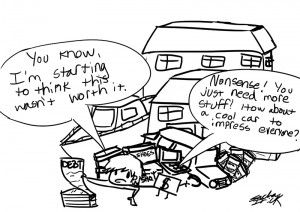
How might you judge a person who drives a 2013 Range Rover versus a person who drives a 1996 Honda Accord? Would you assume the person in the former was happier or more successful than the latter? Would you assume that the person in the former was better in most respects than the person in the latter?
Most people would answer these questions with a yes, whether consciously or sub-consciously.
The University of California and the American Council on Education surveyed a quarter of a million new college students and discovered information that supports the claim that materialism is a growing trend in this country. Out of these students, only 40 percent stated that they were attending college to “develop a meaningful life philosophy,” which was down from 80 percent who were surveyed from the 1970s to the late 1990s. In the same survey, more than 75 percent of these students stated that they were attending college to “obtain financial gain.”
What is the definition of success? Does this definition of success automatically mean that one will be a happy individual?
There’s nothing wrong with wanting to live comfortably.There’s nothing wrong with wanting to have nice things in life. It’s when an obsession develops with having these nice things, in an attempt to be perceived in a certain way, that a problem arises.
Money doesn’t buy happiness — it just buys stuff, and we sure do have an obsession with stuff. Credit cards don’t buy happiness; they just buy stress and debt. Success and happiness are equated with how much stuff we have and credit cards are a quick way to get things we want when we can’t afford them.
According to collegeparents.org, 84 percent of college students have at least one credit card, with the average student having $3,173 of credit card debt. Students are using these credit cards for necessities such as food and books, but 70 percent are also using them for clothes and another 69 percent are using them for cosmetics. While these are necessities at their basic levels, most students aren’t just sticking to the basics. They’re getting more than they need, to appear a certain way. Credit cards are a good way to build up credit while in school, but with the average graduating senior leaving school with $4,100 of credit card debt, on top of the thousands of dollars in student loans, they’re proving to be detrimental.
So, while students are going to college to obtain financial wealth, they’re digging themselves into a hole. They’re trying to appear “successful” out of their season and things out-of-season are never good.
Materialism has led to the development of a nationwide shopping addiction. They could almost be synonymous, and one has definitely led to the other. A shopping addiction boiled down to its base is an obsessive commodity fetish. Materialism is the obsession with acquiring material goods. In many cases, this obsession is driven by the compulsion to be perceived as a successful individual. In this country, success is also perceived to be synonymous with how much material wealth/ is possessed.
Materialism has become a part of the value system in this country. It’s not presenting a pretty picture of the future. We’re headed down a road that says stuff defines who a person is. We’ve gone from owning things to letting them own us.
Our materialism has led us to be an indebted society. Even from childhood, children are learning the art of consumerism, and this does not bode well for their adult lives or the future of this country.
If we don’t change our attitude toward material items, we will only stay in debt, which will and has kept us in its clutches for too long and has taken us further down than we ever wanted to go.
